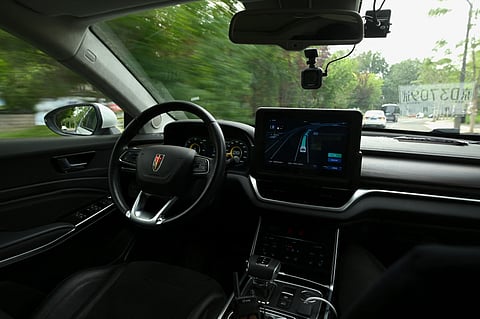Chinese robotaxis now coming to Uber app in the Middle East this year
Robotaxi Pony AI partners with ride hailing giant to launch in the GCC this year

Dubai: Uber’s robotaxi ambitions are shifting into high gear in the Middle East, with a new partnership set to roll out this year. The global ride-hailing giant will integrate vehicles from autonomous driving firm Pony AI into its app, allowing riders in the region to book self-driving cars for the first time through this collaboration.
The move marks another strategic step in Uber’s wider effort to embed autonomous mobility into its international services, and brings Pony AI’s technology closer to mainstream adoption outside of Asia and North America.
Once regulatory approvals are secured, riders will be able to select Pony AI’s autonomous vehicles directly within the Uber app. For now, the cars will include onboard safety drivers during the trial phase, but the long-term goal is to transition to fully driverless rides.
The specific cities where services will debut haven’t yet been confirmed, but the expansion aligns with the Gulf’s broader push toward intelligent transport and AI-driven urban mobility.
Global autonomous network
Uber has been aggressively forming alliances with self-driving companies around the world. Earlier this year, it announced a Europe-focused tie-up with Chinese tech firm Momenta. In the Gulf, it already operates autonomous vehicles through a collaboration with WeRide, a company that’s running robotaxis in Abu Dhabi and has plans to launch in Dubai as well.
This new partnership with Pony AI widens Uber’s bench of autonomous tech providers and signals growing investor and industry confidence in robotaxi deployment outside traditional test markets like the U.S. and China.
High-stakes bet for Pony AI
For Pony AI, the Middle East partnership could prove crucial. The firm is targeting profitability by the end of the decade, but it reported a significant loss of $274 million in 2024. After a volatile post-IPO ride—including an 80% plunge in its stock price earlier this year—the company’s recent rebound has been powered by strategic moves like its integration with Tencent’s WeChat in China.
With its Uber partnership in the Middle East, Pony AI is betting that tapping into the region’s growing appetite for smart mobility could stabilize revenues and help regain momentum with investors.
Why it matters:
The Gulf is fast becoming a global testbed for autonomous vehicles, driven by innovation-friendly policies and heavy investment in smart city infrastructure.
Uber’s multi-partner model reflects a broader industry trend: collaboration over consolidation, where big platforms act as aggregators of various self-driving technologies.
As regulators across the Middle East begin formalizing autonomous mobility frameworks, early mover partnerships like this one may define the region’s next phase of transportation.
Bottom Line: Uber and Pony AI’s collaboration brings autonomous vehicles a step closer to everyday use in the Middle East. For both companies, the region offers a chance to scale, test, and showcase the future of urban mobility—where your next Uber might not have a driver at all.
Sign up for the Daily Briefing
Get the latest news and updates straight to your inbox


